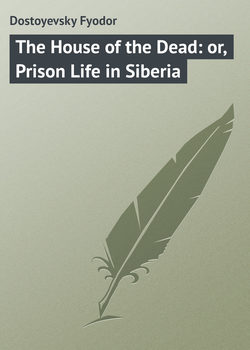Читать книгу The House of the Dead: or, Prison Life in Siberia - Федор Достоевский, Dostoyevsky Fyodor, Fyodor Dostoevsky - Страница 1
INTRODUCTION
Оглавление"The Russian nation is a new and wonderful phenomenon in the history of mankind. The character of the people differs to such a degree from that of the other Europeans that their neighbours find it impossible to diagnose them." This affirmation by Dostoïeffsky, the prophetic journalist, offers a key to the treatment in his novels of the troubles and aspirations of his race. He wrote with a sacramental fervour whether he was writing as a personal agent or an impersonal, novelist or journalist. Hence his rage with the calmer men, more gracious interpreters of the modern Sclav, who like Ivan Tourguenieff were able to see Russia on a line with the western nations, or to consider her maternal throes from the disengaged, safe retreat of an arm-chair exile in Paris. Not so was l'âme Russe to be given her new literature in the eyes of M. Dostoïeffsky, strained with watching, often red with tears and anger.
Those other nations, he said – proudly looking for the symptoms of the world-intelligence in his own – those other nations of Europe may maintain that they have at heart a common aim and a common ideal. In fact they are divided among themselves by a thousand interests, territorial or other. Each pulls his own way with ever-growing determination. It would seem that every individual nation aspires to the discovery of the universal ideal for humanity, and is bent on attaining that ideal by force of its own unaided strength. Hence, he argued, each European nation is an enemy to its own welfare and that of the world in general.
To this very disassociation he attributed, without quite understanding the rest of us, our not understanding the Russian people, and our taxing them with "a lack of personality." We failed to perceive their rare synthetic power – that faculty of the Russian mind to read the aspirations of the whole of human kind. Among his own folk, he avowed, we would find none of the imperviousness, the intolerance, of the average European. The Russian adapts himself with ease to the play of contemporary thought and has no difficulty in assimilating any new idea. He sees where it will help his fellow-creatures and where it fails to be of value. He divines the process by which ideas, even the most divergent, the most hostile to one another, may meet and blend.
Possibly, recognising this, M. Dostoïeffsky was the more concerned not to be too far depolarised, or say de-Russified, in his own works of fiction. But in truth he had no need to fear any weakening of his natural fibre and racial proclivities, or of the authentic utterance wrung out of him by the hard and cruel thongs of experience. We see the rigorous sincerity of his record again in the sheer autobiography contained in the present work, The House of the Dead. It was in the fatal winter of 1849 when he was with many others, mostly very young men like himself, sentenced to death for his liberal political propaganda; a sentence which was at the last moment commuted to imprisonment in the Siberian prisons. Out of that terror, which turned youth grey, was distilled the terrible reality of The House of the Dead. If one would truly fathom how deep that reality is, and what its phenomenon in literature amounts to, one should turn again to that favourite idyllic book of youth, by my countrywoman Mme. Cottin, Elizabeth, or the Exiles of Siberia, and compare, for example, the typical scene of Elizabeth's sleep in the wooden chapel in the snow, where she ought to have been frozen to death but fared very comfortably, with the Siberian actuality of Dostoïeffsky.
But he was no idyllist, though he could be tender as Mme. Cottin herself. What he felt about these things you can tell from his stories. If a more explicit statement in the theoretic side be asked of him, take this plain avowal from his confession books of 1870-77: —
"There is no denying that the people are morally ill, with a grave, although not a mortal, malady, one to which it is difficult to assign a name. May we call it 'An unsatisfied thirst for truth'? The people are seeking eagerly and untiringly for truth and for the ways that lead to it, but hitherto they have failed in their search. After the liberation of the serfs, this great longing for truth appeared among the people – for truth perfect and entire, and with it the resurrection of civic life. There was a clamouring for a 'new Gospel'; new ideas and feelings became manifest; and a great hope rose up among the people believing that these great changes were precursors of a state of things which never came to pass."
There is the accent of his hope and his despair. Let it prove to you the conviction with which he wrote these tragic pages, one that is affecting at this moment the destiny of Russia and the spirit of us who watch her as profoundly moved spectators.
JULIUS BRAMONT.
BIBLIOGRAPHY
(Dostoïeffsky's works, so far as they have appeared in English.)
Translations of Dostoïeffsky's novels have appeared as follows: – Buried Alive; or, Ten Years of Penal Servitude in Siberia, translated by Marie v. Thilo, 1881. In Vizetelly's One Volume Novels: Crime and Punishment, vol. 13; Injury and Insult, translated by F. Whishaw, vol. 17; The Friend of the Family and the Gambler, etc., vol. 22. In Vizetelly's Russian Novels: The Idiot, by F. Whishaw, 1887; Uncle's Dream; and, The Permanent Husband, etc., 1888. Prison Life in Siberia, translated by H. S. Edwards, 1888; Poor Folk, translated by L. Milman, 1894.
See D. S. Merezhkovsky, Tolstoi as Man and Artist, with Essay on Dostoïeffsky, translated from the Russian, 1902; M. Baring, Landmarks in Russian Literature (chapter on Dostoïeffsky), 1910.
